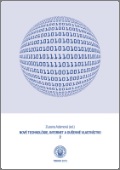Michal Černý
Úplný text príspevku
- Typ dokumentu: publikácia
- Typ príspevku: štúdia
- Jazyk príspevku: čeština
- Publikované: 2015
- Formát súboru: PDF
- Veľkosť súboru: 169 kB
In: ADAMOVÁ, Z. (ed.) Nové technológie, internet a duševné vlastníctvo 2. Trnava: Typi Universitatis Tyrnaviensis, spoločné pracovisko Trnavskej univerzity v Trnave a VEDY, vydavateľstva Slovenskej akadémie vied, 2015, s. 147-176. ISBN 978-80-8082-933-9.
Summary: Designations of Origin and Geographical Indications represent an already established categories of intangible things – rights that belong within a wider range of industrial rights and thus then to intangible assets, respectively. They can be considered as intangible things under the new Civil Code (of Czech Republic). They are recorded in special registers in connection with material things. This paper deals with the provision of legal protections review modes and also a reflection about the possibility registration of designation of origin or geographical indication for the service. It also deals with the hypothetical possibility of registration of geographical indication for an intangible thing. Last but not least is dealing with the question of intangible element (eg. the know-how, formulas etc.) which in many cases is present in material things for which they have been geographical indications (or appellations of origin registered). We often do not think on the intangible element but it is present Registration of geographical indications for tangible thing (support of intangible element) is precluded. On the contrary, some new intangible things (eg. a computer program), it can hardly imagine that it would ever be possible to consider the protection of the geographical indication registered for the carrier because the program itself is usually bigger and better reputation than its tangible support. It is quite evident in computer games that can have a global reputation. If such intangible thing was tied to a specific geographical location, it would be theoretically possible to provide protection for geographical indications on immaterial things. This applies only on condition that the legislation governing geographical indication will have factually universal application framework. The law on the protection of designations of origin and geographical indications (Czech Republic) has such nearly universal character because it excludes only immovable assets. Civil Code of the Czech Republic (Act no. 89/2012 Coll.) considers intangible things as movable things. Therefore, it makes sense to think of such a possibility as well. Finally – Czech law allows the designation of origin or geographical indication for service. The difference between the service and intangible things may consist in the fact that there is no directly visible result for service in the material world or in the virtual space. Intangible thing is manifested through its tangible medium in the outside world.
URL: http://ntidv.iuridica.truni.sk/archive/ntidv-2/NTIDV-2-Cerny-Michal.pdf
Bibliografická citácia
ČERNÝ, M. Úvaha nad možností ochrany služeb nebo nehmotných věcí pomocí zeměpisných označení nebo označení původu. In: ADAMOVÁ, Z. (ed.) Nové technológie, internet a duševné vlastníctvo 2. Trnava: Typi Universitatis Tyrnaviensis, spoločné pracovisko Trnavskej univerzity v Trnave a VEDY, vydavateľstva Slovenskej akadémie vied, 2015, s. 147-176. ISBN 978-80-8082-933-9.
